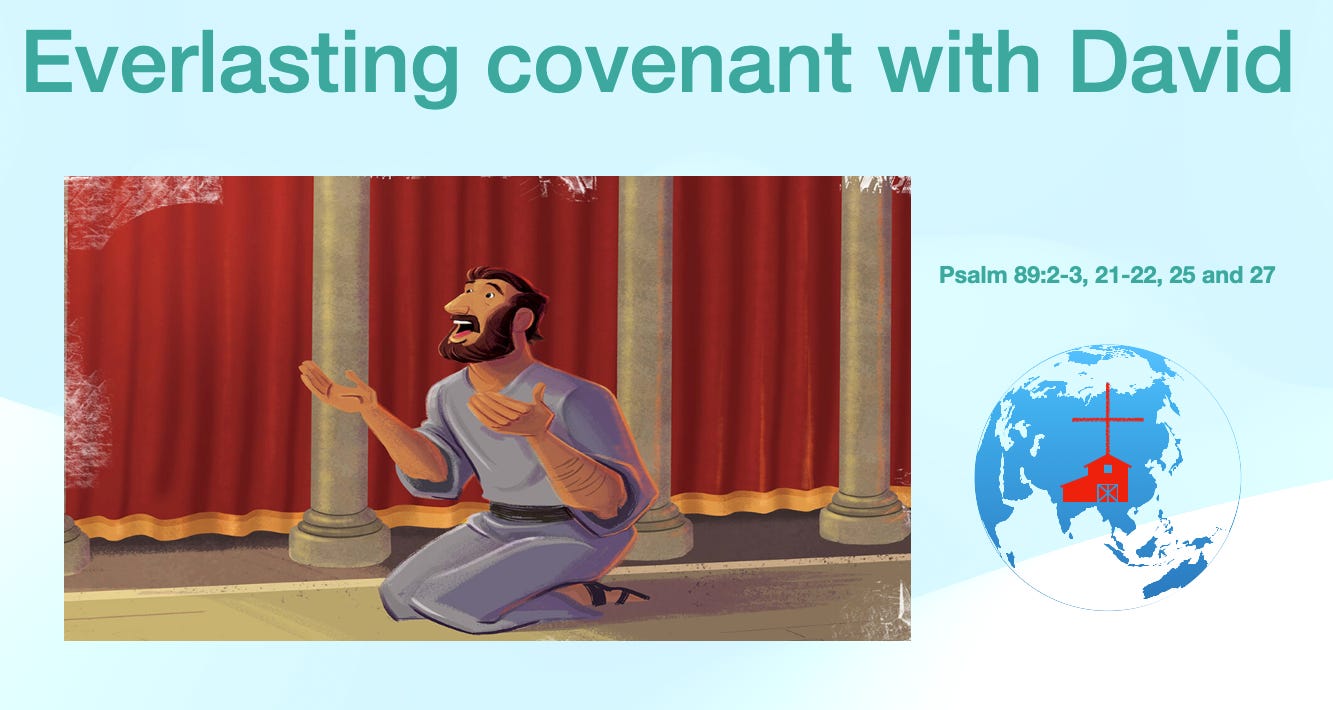Psalm 89:2-3, 21-22, 25 and 27
The Davidic monarchy lasted from 1000 to 587 BCE and then it was gone. Psalm 89 reflects on God’s covenant with David. In 2 Samuel God promised David an offspring for whom the Lord would establish a kingdom that was supposed to last forever (2 Sam 7:12-16). David in his last words called it “an everlasting covenant” (2 Sam 23:5). But then came the tragic year 587 BC that seemed to end the Davidic monarchy. How could it be possible? What about God’s faithfulness and mercy?
On the historical level, Israel never returned to its glorious past. The Davidic monarchy was never permitted to be restored by the powerful empires of Persia, Greece, and Rome. But Israel never gave up its hope for the offspring of David for whom God would establish an everlasting kingdom. When the monarchy was collapsing during the time of the Babylonian invasion, prophet Jeremiah prophesied about “a righteous Branch” to be raised up for David, a wise king who would “execute justice and righteousness in the land” (Jer 23:5-6). And prophet Ezekiel living in Babylon with the exiled people was speaking about someone called God’s “servant David” to shepherd Israel (Ezek 34:23-24).
This hope was alive during the time of Jesus. The question of John the Baptist addressed to Jesus reveals that hope: "Are you the one who is to come, or are we to wait for another?" (Luke 7:20). According to the Gospel of Matthew, although the descendants of David did not sit on David’s throne in Jerusalem, the line of David did not disappear. The Evangelist traces the line from David all the way to Saint Joseph, the foster father of the Messiah (see Matt 1:1-16). The miraculous conception and birth of Jesus Christ is the answer to the psalmist’s complaint about the tragic end of the Davidic monarchy: “Lord, where is your steadfast love of old, which by your faithfulness you swore to David (Ps 89:50)?
The New Testament gives Jesus Christ, the title “the King of kings and Lord of lords” (1 Tim 6:15; see also Rev 17:14; 19:16). In the Gospel of John, Jesus speaks about his kingdom that is not of this world (see John 18:36) and at the end of Matthew’s Gospel, the risen Jesus declares that “all authority in heaven and on earth has been given to” him (Matt 28:18). The Church’s liturgical year ends with the solemnity of Christ the King that proclaims Jesus Christ as the King of the universe and describes his kingdom as “an eternal and universal kingdom” of truth and life, holiness and grace, justice, love, and peace (see Preface of CHRIST THE KING).
The Gospel proclaims the goodness of the Lord, his faithfulness and mercy. The unconditional covenant with David has been fulfilled in Jesus Christ, “who was descended from David according to the flesh” (Rom 1:3). But before Christ has been declared “the King of kings and Lord of lords” (1 Tim 6:15), he was first charged with being “the king of the Jews” and nailed to the cross (John 19:19). To save us from our sins and to establish an everlasting kingdom, Jesus had to suffer and die. But this suffering and death could not nullify God’s covenant. The one who addressed God, “Abba, Father”, destroyed death and reigns forever.




